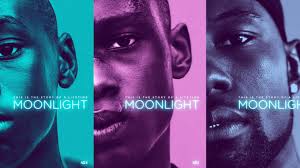Moonlight
 Moonlight is an intense sorrowful socially conscious film about growing up poor, black and gay. The film follows a young man from childhood to his teen years to his young adult years. Each stage of his life is played by a different actor, each performance powerful.
Moonlight is an intense sorrowful socially conscious film about growing up poor, black and gay. The film follows a young man from childhood to his teen years to his young adult years. Each stage of his life is played by a different actor, each performance powerful.
What spoke to me the most about this film is the reality of growing up poor in America. How do we help children who are born into poverty find a path out? In the film, the main character Chiron, lives in a downtrodden black neighborhood in Miami. His mother is on crack and turns tricks to support her habit. He is a single child being raised by a single Mom who can barely take care of himself. He is numb from the violence and drugs from the time he is barely 6. He knows he is gay but isn’t sure how to process that. He is essentially on his own. He is bullied in school yet the entire education system turns a blind eye until he finally fights back and it is him who they turn on. Where are the social workers? Where are the people to help this young man break the pattern of poverty?
I know that our kids understand how privileged they are just being born into the world they came from. They were educating in the best schools, they were given opportunities to expand their minds and in turn their horizons, they were able to feel safe growing up knowing someone was watching out for them and care about their lives. Shouldn’t all kids be able to achieve the most for themselves?
As a society we are responsible for these young people. It is our moral failing that we have not created a strategy that helps and motivates the next generation of poor children to get past the issues that they see in their neighborhood every day. Child poverty is devastating. Children in poverty deserve a good education, engaged role models and a system they can count on to pull them out of poverty so they can use their youthful energy to get out of the downward cycle they are in.
How do we expect these kids to grow up and out of where they came from? Moonlight has many layers but more important it asks the question to the viewer….how can we as a society help these children? The movie made my heart weep.


Comments (Archived):
First step: School choice. We can’t control parenting, and we can’t control home life. We can give them hope by rescuing them from a bureaucratic unionized one size fits all public school system resistant to any change.
agree
Can you share anything about how this could work?Its easy to say decentralize everthying, free market everything–and I agree, this to me is the answer in abstract.But to real poverty like Joanne describes it will take more. It will take funded programs to hand hold and change culture.How is that done? Funded? Managed?
Put the power of choice into hands of people. Give them vouchers tied to a Blockchain that can only be used for schools. Deregulate education and allow competition. That’s it loosely but of course much deeper than that. Why not unbundle schools?
I agree with all of that.But–my parents were at the lower end of the middle class economically but smart, educated and focused on their kids education with a passion. Your plan would work with them.But for a child like in this post with parents who are not capable of guiding, your plan helps not at all.That’s my point.
School choice is, IMHO, a non-starter as the lives of these children are affected much more by what happens outside of school. Without the requisite wrap around services, sending these kids to Andover every day would, at best, move the needle marginally. And that isn’t to say they don’t have the aptitude, but just that the rhythms of their very existence tend to be at opposing frequencies to traditional academic success.Which leads to what moved me to respond to this piece. The last two paragraphs have stuck with me all day, especially the use of the word “society”. One definition of the word is: ‘the aggregate of people living together in a more or less ordered community.’ The overarching challenge that we have as a nation, exemplified by the current political discourse, is that we’ve moved away from this definition. The concept of being responsible for our fellow man is not something, as a nation, we believe in. Only then will the weakest among us be given the foundation to achieve their fullest potential. Until then, stories like ‘Moonlight’ will be more of the norm.
It is an interesting observation. I fully believe we should feel something about our fellow man.